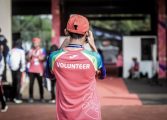By Page H. Gifford
Correspondent
Dr. Michael Cary Jr. RN, Ph.D., was inducted into the American Academy of Nursing in Washington, D.C. on Oct. 30. This is the highest award given in the nursing field and this year’s class of fellows was the largest since the AAN’s inception 50 years ago. A total of 250 leaders throughout the U.S. and worldwide were recognized for their work in changing the face of nursing. The theme for this year’s event was From Reflection to Impact: Positioning Nursing’s Future. The fellows are now included among the 3,000 leaders who are experts in policy, research, administration, practice, and academia.
Nursing is a growing field for men, though men still only make up 14 percent of nurses. In 1988, 6,800 nurses were men but by 2018, over 314,000 entered the nursing field. As Dr. Cary well knows, men experience discrimination in a field dominated by women, particularly those who are black. For centuries the word “nursing” has been equated with women.
Induction into the AAN is a significant marker for past and current accomplishments. For Dr. Cary, this is the pinnacle of success in having his work recognized so it can help others.
Last year, he received the Raymond Gavins Distinguished Faculty Award for his work as an associate professor at Duke University. A graduate of Fluvanna High School, he attended James Madison University where he earned a Bachelor of Science in health services and administration. He worked in a regional office of a large health insurance company as a quality consultant. He was primarily responsible for overseeing a financial incentives program for primary care providers in their regional market.
After leaving the insurance company due to restructuring and elimination of jobs, Dr. Cary ended up getting his degree in nursing at the University of Virginia.
“My path to nursing was unexpected.”
In an interview last year, he explained his journey on his newfound path and why it was so important. It was during his “fateful experience” that he found his passion for gerontological nursing, caring for older adults and their families. After completing his clinical practicum and graduating from the ABSN program at the University of Virginia (UVa.), he worked in a post-acute rehabilitation and long-term care facility as a staff nurse, caring for the entire census of 35 to 52 post-acute and chronically ill older adults.
“Because of the volume of older adults and inadequate staffing levels, it was nearly impossible to be everywhere I was needed and patient care was often delayed. Even with my first degree and experience in health administration, I knew I needed additional training.” This led Michael to enroll and complete the requirements for his Master of Science in Nursing (MSN) and doctorate (Ph.D.) in Nursing Science degrees at UVa.
He realized that this was an opportunity to not only understand through interaction and hands-on but to become a scientist and leader who could help reshape healthcare. As a professor, he passes along his first-hand knowledge to his students through his experiences. But he is also aware of students of color, and their need for acceptance.
“Unfortunately, many students of color continue to feel disconnected during the nursing programs. More than ever before, we need nursing programs that value diversity, inclusivity, and a sense of belonging. Concerted efforts are needed to recruit and retain faculty from underrepresented racial/ethnic backgrounds.”




